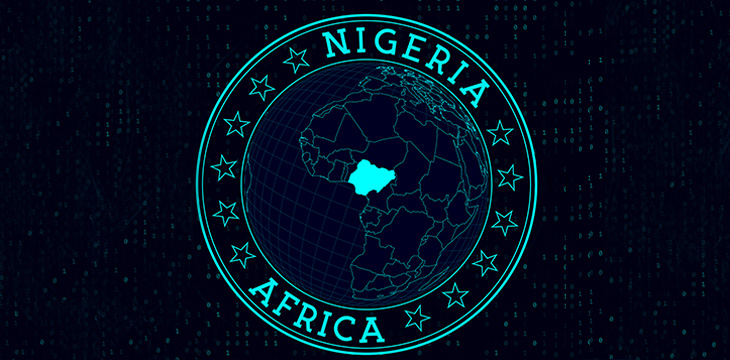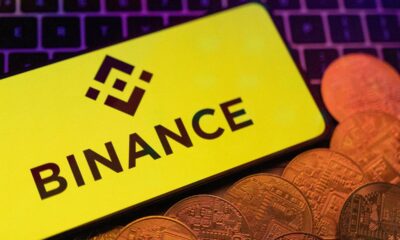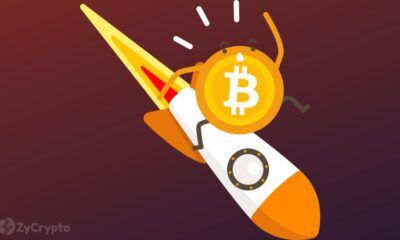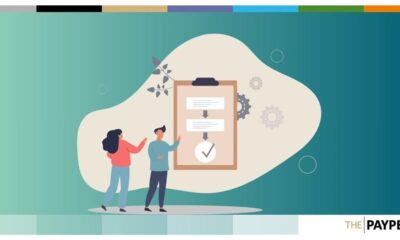News
To avoid the danger, the United States must be at the forefront of cryptocurrency and blockchain

“Those who came before us made sure this country rode the first waves of the industrial revolution, the first waves of modern inventions and the first wave of nuclear energy, and this generation does not intend to sink in the undertow of the future age of space . We intend to be part of it, we intend to lead it.”
This was President Kennedy more than half a century ago. Even then, he understood better than most that America’s place in the world was tied to our determination to be at the forefront of progress. We were a beacon of hope because the world knew that we would use our technological prowess to expand the rule of law and basic human rights for all people. America’s promise was to ensure that discoveries were used for the good of humanity.
Today, that same spirit still animates some elements of progressive thought. My partner Democrats they are not trying to stifle the emerging industry born of artificial intelligence: they are trying to establish wise and fair rules that ensure both that it is implemented safely and that it benefits everyone, not just the wealthy. They refuse to cede the advanced semiconductor industry to foreign firms, instead helping to push the industry to build “fabs” nationwide in places like my home state of Ohio. On a range of issues, Democrats are determined to keep America ahead.
fotomek/stock.adobe.com
But when it comes to blockchain—that is, the new technology that promises to power a new set of secure, decentralized, and transparent applications across a whole range of industries—many Democrats seem to have lost sight of Kennedy’s warning. Having become convinced that various misuses of blockchain undermine its underlying value, Sen. Elizabeth Warren and its allies seem more interested in stifling innovation than harnessing its potential for public good. While their concerns are understandable, their approach is fundamentally misguided.
To some extent, this challenge is less about this technology and more about the appropriate role government should play in shaping innovation. Blockchain, like nuclear fission, jet propulsion and satellite reconnaissance, and, yes, artificial intelligence, can be used for nefarious purposes. But that should not push Washington to try to stifle its development, or push it abroad. What we need to do, instead, is develop a proactive approach to foster its evolution and shape its impact. And that starts by dispelling what fuels public suspicions, namely that cryptocurrencies and blockchain constitute a hidden world of dark, mysterious, and dangerous activity.
It’s easy to see why ordinary people care about new technologies like artificial intelligence and blockchain. All those of us of a certain age saw Terminator when we were (probably too) young. The word “cryptocurrency” seems to connote that systems love Bitcoin or Ethereum were born where the monks were buried in the Middle Ages.
What’s worse is that the criminal fraud perpetrated by Samuel Bankman-Fried has fueled the idea that the industry is inherently corrupt. Today, many have reason to assume that terrorist organizations like it Hamas they are using blockchain to launder funds in ways that responsible authorities cannot trace.
The truth, however, is exactly the opposite. Far from being hidden, financing carried out using the blockchain is entirely decentralized, secure and transparent: this is, in fact, its distinctive feature. Transactions made via this new medium cannot be made without an intermediary because the technology itself creates separate ledgers that can be tracked forever. It is much easier to smuggle money earned from the sale of stolen art than to transfer money via blockchain.
Better yet, blockchain, like artificial intelligence or nuclear physics, can also be used to solve all sorts of other problems. Instead of allowing big tech to control and sell our personal data, this new technology will allow consumers to sell it directly or choose not to sell it at all.
In short, these innovations can, if managed correctly, restore power to citizens who have felt powerless for decades. But to get there we will need a clear, open and understandable regulatory regime. If blockchain will work for the greater good, it cannot be left to the dangers of the wild west. The crazy thing is that blockchain’s biggest proponents realize this: they’re demanding to be regulated.
Realizing that everyone would benefit if Washington established clear rules, those who believe in blockchain are turning to them Congress and federal government regulatory agencies to eliminate the ambiguity that now threatens to impede future growth and innovation. But, to date, Washington has not responded.
Fortunately, Congress is now working to create the kind of regulatory regime that will do exactly that: a bill to ensure that cryptocurrencies are not forced offshore where American regulators are unable to protect the public from those seeking to abuse them . A bill drafted by some of my former colleagues, known as Fit 21, would clarify which of the many federal financial agencies would oversee blockchain applications in the financial world, establish disclosure requirements to protect against a second FTX fraud, and set the necessary guidelines for maintain a safe secondary market for digital commodities. A bunch of smart young progressives, including the congressman from California Ro Khanna, are at the forefront of this issue; they aligned themselves with JFK and Democratic partyit’s old school. But too many of their progressive colleagues have yet to see the light.
Today, Democrats charged with addressing the dangers and opportunities of new technologies often face a false choice. They feel obligated to let it evolve sight unseen, as many free market fundamentalists often demand, or they seek to stifle innovation altogether, as Senator Warren and her allies want to do with blockchain.
President Kennedy made it clear that there is a middle ground.
We can leverage the best of blockchain, preventing our adversaries from developing it offshore and protecting the public from abuse. But to do this we will need to create a clear and transparent regulatory regime to oversee its development.
Fit 21 will allow potentially transformative technology like artificial intelligence to grow safely here in the United States. Here, at last, is another opportunity for America to take the lead. I just hope my Democratic colleagues are on the right side of history. President Kennedy would like it to be that way.
Tim Ryan is a member of the Coinbase Global Advisory Council and co-chair of the Blockchain Innovation Project. He is a senior advisor to the Progressive Policy Institute’s American Workers Campaign.
The opinions expressed in this article belong to the writer.
Uncommon knowledge
Newsweek is committed to challenging conventional wisdom and finding connections in the search for common ground.
Newsweek is committed to challenging conventional wisdom and finding connections in the search for common ground.
News
Blockchain Technology Will Transform Water Access and Management Globally

Disclosure: The views and opinions expressed here are solely those of the author and do not represent the views and opinions of the crypto.news editorial team.
Access to clean water is a basic human need, yet billions of people around the world still struggle to get it. According to the World Health Organization, over 2 billion people live in countries suffering from severe water stress, and this number is expected to continue to grow due to climate change and population growth.
Traditional water management systems have struggled to address these challenges, often hampered by inefficiencies, lack of transparency, and misallocation of resources. Blockchain technology offers a promising solution to these challenges, providing equitable access and sustainable use of this crucial resource.
The current state of water management
Water management today faces several pressing issues. Inefficiencies in water supply, distribution, and use, coupled with a lack of real-time monitoring, often result in resource waste and misallocation. Many water sources fail to realize their full potential due to infrastructure and financing shortfalls. For example, the Environmental Protection Agency (EPA) report indicated that the United States would need to invest $625 billion over the next 20 years to repair, maintain and improve the country’s drinking water infrastructure due to aging pipes and other infrastructure problems. Additionally, in the United States alone, household leaks can to waste nearly 900 billion gallons of water per year nationwide. This is equivalent to the annual domestic water consumption of nearly 11 million homes.
Furthermore, corruption and mismanagement of water resources can cause unequal distribution, with disadvantaged communities often bearing the brunt of water scarcity. For example, South Africa is struggling with myriad challenges to its water security: drought, inadequate water conservation measures, outdated infrastructure, and unequal access to water resources. The country faces significant water scarcity, with demand expected to outstrip supply by 2030, creating a projected gap of 17%.
Furthermore, the global water industry is highly monopolized, with a few key players controlling a significant share of the market. These companies exert substantial influence over the water supply chain, often prioritizing profit over equitable distribution and environmental responsibility. This concentration of power can lead to inflated prices and limited access for vulnerable populations. The global bottled water market alone is projected to reach $509.18 billion by 2030, with these large companies capturing a significant share of revenue. This monopolization exacerbates existing inequalities in water access and highlights the need for more decentralized and community-driven water management solutions.
Source: Grand View Search
The potential of blockchain in water management
Blockchain technology can address these issues by providing a transparent, secure, and decentralized platform for water resource management. This approach offers several advantages:
- Transparency and accountability. Blockchain’s immutable ledger ensures that all transactions and data entries are transparent and cannot be changed once recorded. This transparency can reduce corruption and ensure that water resources are allocated fairly and efficiently. For example, blockchain can be used to track water usage from source to end user, providing a clear record of how water is distributed and used. This level of transparency can help hold authorities accountable and manage water resources sustainably.
- Efficient resource management. Blockchain can facilitate the creation of smart contracts, which are self-executing contracts with the terms of the agreement written directly into the code. These contracts can automate water distribution based on real-time data, directing water to where it is needed most. For example, smart contracts could be used to manage urban water supply systems, automatically adjusting water distribution based on real-time consumption patterns and demand. This can help optimize water use, reduce waste, and ensure that households and businesses receive the right amount of water at the right time.
In Dubai, the Dubai Electricity and Water Authority (DEWA) has implemented a blockchain-based smart water network initiative as part of its broader smart city strategy. This project integrates blockchain technology with IoT sensors to monitor water usage in real time, manage distribution, and detect leaks. The decentralized ledger ensures data integrity and transparency, enabling more efficient water management and reduced waste. DEWA’s initiative aims to improve sustainability and resource management in the rapidly growing city, highlighting the potential of blockchain to support urban water management and conservation efforts.
Community participation and ownership
Through blockchain, individuals can directly control and monetize their access to water resources, eliminating the need for third-party intermediaries. This direct control model allows local communities to make collective and transparent decisions about their water use. By managing their water directly from the source, communities can tailor water management practices to their specific needs, promoting equitable distribution and encouraging a sense of accountability and stewardship.
Additionally, future models could allow people to monetize their access to water through web3 technologies. For example, a community-to-business (C2B) model could allow people to sell water directly to companies. In this model, people do not have to own the water directly, but can profit by staking their tokens during event sales pools. This approach not only supports sustainable water management, but also creates economic opportunities for community members. Additionally, a “Burn to Secure” protocol can be used to provide water allocation rights. This protocol provides a true sense of water security and financial opportunity by allowing people to redeem their rights. This system not only secures future water allocations, but also increases token scarcity and value.
Additionally, a pure sense of investment is achieved through investments in water sources. This leads to potential financial returns and dividends by addressing the inefficiencies in water supply mentioned above. By investing to finance infrastructure projects, such as building factories and improving distribution systems, more water can be brought to communities, creating additional economic opportunities.
Monetizing water access through the C2B model, the “Burn to Secure” protocol, and investments in water sources all generate economic benefits for the community, promoting a more equitable and efficient water management system.
Overcoming challenges
While blockchain technology has the potential to improve water management, there are challenges to its adoption. The complexity of blockchain systems and the need for technological infrastructure can be barriers, especially in developing regions. Additionally, there are concerns about the significant energy consumption of blockchain networks. However, technological advances and the development of more energy-efficient blockchain solutions are helping to alleviate these concerns. Additionally, education and capacity building are key to ensuring stakeholders understand how to effectively use blockchain technology. Governments, NGOs, and private sector partners need to work together to provide training and support to communities and water management authorities.
Blockchain technology offers a practical and effective means to improve water management. In addition to addressing inefficiencies, blockchain empowers communities, promotes sustainable practices, and opens up new economic opportunities through models like community-to-business (C2B). As we face the growing challenges of climate change and population growth, blockchain is not only an innovative solution, but represents a fundamental shift in the way we manage and value water resources. Adopting blockchain in water management is essential to creating a sustainable and equitable future by changing the way we interact with and protect our most vital resource.

Jean-Hugues Gavarini
Jean-Hugues Gavarini is the CEO and co-founder of LAKE (LAK3), a real-world asset company leveraging blockchain technology to decentralize access to the global water economy. LAKE aims to ensure access to clean water for all, protect water resources, and deliver water to those in need through innovative technologies. Jean-Hugues has a diverse career spanning the luxury, fashion, and footwear industries. His career path includes notable successes at Mellow Yellow, Cremieux, and Tod’s. Raised between Silicon Valley and the French Alps, Jean-Hugues has always been immersed in technology and freshwater resources. In 2018, Jean became the CEO of Lanikea Waters, a water solutions entity based in the French Alps. In 2019, the concept of LAKE was born, embodying his commitment to innovation and sustainability.
News
Blockchain and AI Expo 2024

With rapid advances in the world of AI and blockchain, there are opportunities to leverage the security and transparency features of blockchain to improve the reliability and trust of AI systems and data transactions.
Explore the synergy of these advanced technologies in virtual mode Blockchain and AI Expowhich takes place on October 31, 2024 TO 10:00 GMT.
The event features cutting-edge presentations led by leading experts in evolving fields. Presentations are set to explore opportunities and challenges in the fusion of blockchain and AI, real-world applications, ethics, innovations in environmental sustainability, and more!
Gain a comprehensive understanding of how these technologies can synergistically drive innovation, optimize operations, and promote strategic growth opportunities. Develop your knowledge to facilitate informed decision making and give your company a competitive edge in the growing technology landscape.
News
Nigeria Eyes National Blockchain Nigerium for Data Sovereignty

Nigeria is keeping an eye on a new native blockchain network to protect the country’s data sovereignty.
According to local media, a team from the University of Hertfordshire has proposed the new blockchain, Nigeriato the National Information Technology Development Agency (NITDA).
Chanu Kuppuswamy, who leads the team, argued that relying on blockchain networks whose developers are located in other regions poses national security risks to the Nigerian government. He further said that Nigerium would allow the West African nation to customize the network to meet specific needs, while also promoting data sovereignty.
In his presentation, Chanu cited the recent migration of Ethereum to test of participation (PoS) consensus as an instance in which no Nigerians were involved but whose impact is far-reaching.
“Developing an indigenous blockchain like Nigerium is a significant step towards achieving data sovereignty and promoting trust in digital transactions in Nigeria,” he said.
While receiving the proposals in Abuja, NITDA’s Kashifu Abdullahi acknowledged the benefits a local blockchain would bring to Nigeria, including increased security of citizens’ data.
However, a NITDA spokesperson later clarified that Nigerium is still at the proposal stage and that the government has not yet decided whether to proceed or not.
“The committee is still discussing the possibility with stakeholders. Even if a decision is finally made, there is no guarantee that the name will be Nigerium,” the spokesperson told the media.
Nigerium’s reception in the country has been mixed. Some, like financial analyst Olumide Adesina, To say the network is “dead on arrival”. He believes the Nigerian government’s poor record in following through on its big technology plans will claim another victim. He pointed to the eNaira as a missed opportunity whose chances of success were much higher than those of Nigerium.
Others welcomed the proposal. Chimezie Chuta, who chairs the renewed The Nigerian Blockchain Policy Committee is “extremely optimistic“that Nigerium will be more successful than eNaira.
Speaking to a local news agency, Chuta stressed that eNaira failed because the central bank initiated the project on its own, without involving any stakeholders.
“They just cooked it and expected everyone to like it. [With Nigerium]there will be a lot of collaboration,” he said.
Registration of property title, digital identity and Certificate Verification are among the use cases that Nigerium is expected to initially target. However, Nigeria has already made progress in some of these fields through public blockchains.
SPPG, a leading school in governance and politics, announced in May the country’s first blockchain certificate verification system. Built on the The BSV BlockchainIt was developed in collaboration with the blockchain data recording company VX Technologies and local lender Sterling Bank.
Watch: The Future Has Already Arrived in Nigeria
 Italian: https://www.youtube.com/watch?v=M40GXUUauLU width=”560″ height=”315″ frameborder=”0″ allowfullscreen=”allowfullscreen”>
Italian: https://www.youtube.com/watch?v=M40GXUUauLU width=”560″ height=”315″ frameborder=”0″ allowfullscreen=”allowfullscreen”>
New to blockchain? Check out CoinGeek Blockchain for Beginners section, the definitive guide to learn more about blockchain technology.
News
Cambodian CBDC Developer to Build Palau Bond Market on Blockchain: Report

A Japanese fintech developer will build a blockchain-based bond market gateway for Palau, aiming to launch a trial in 2024 and a full launch the following year.
Japanese fintech developer Suramitsubest known for developing a central bank digital currency (CBDC) for Cambodia, is intended to build a Blockchain-gateway to the bond market based on the Pacific island nation of Palau, Nikkei He learned.
Soramitsu won the contract and plans to introduce the market on a trial basis in fiscal 2024, with a full launch scheduled for the following year, allowing the Palauan government to issue bonds to individual investors and efficiently manage principal and interest payments, according to the report.
The total cost of the project is estimated at several hundred million yen ($1.2 million to $5.6 million), less than half the cost of a non-blockchain alternative, people familiar with the matter said. The project has reportedly received support from Japan’s Ministry of Economy, Trade and Industry, with Japan’s foreign and finance ministries providing strategic and management advice on the project.
Soramitsu’s successful development of Cambodia’s CBDC in 2020 has boosted its reputation, with the digital currency’s popularity soaring, with over 10 million accounts opened by December 2023, representing 60% of Cambodia’s population. Following this, Cambodia’s central bank governor Chea Serey indicated intends to expand the reach of its CBDC internationally, particularly through collaboration with UnionPay International, the Chinese card payment service, and other global partners.
While Soramitsu’s work in Cambodia has been well received, the long-term popularity of CBDCs remains to be seen. As of late June, crypto.news reported a sharp drop in activity in India’s digital currency, the e-rupee, after local banks stopped artificially inflating its values.
According to people familiar with the matter, the Reserve Bank of India managed to hit the 1 million retail transaction milestone last December only after the metrics were artificially infiltrated by local banks, which offered incentives to retail users and paid a portion of the bank’s employees’ salaries using the digital currency.
-

 News1 year ago
News1 year ago“Captain Tsubasa – RIVALS” launches on Oasys Blockchain
-

 Ethereum1 year ago
Ethereum1 year agoComment deux frères auraient dérobé 25 millions de dollars lors d’un braquage d’Ethereum de 12 secondes • The Register
-

 News1 year ago
News1 year agoSolana ranks the fastest blockchain in the world, surpassing Ethereum, Polygon ⋆ ZyCrypto
-

 Videos1 year ago
Videos1 year agoHistoric steps for US cryptocurrencies! With a shocking majority vote!🚨
-

 Videos1 year ago
Videos1 year agoIs Emorya the next gem💎 of this Bitcoin bull run?
-

 News1 year ago
News1 year agoSolana Surpasses Ethereum and Polygon as the Fastest Blockchain ⋆ ZyCrypto
-

 Videos1 year ago
Videos1 year agoNexus Chain – Ethereum L2 with the GREATEST Potential?
-

 Ethereum1 year ago
Ethereum1 year agoScaling Ethereum with L2s damaged its Tokenomics. Is it possible to repair it?
-

 News1 year ago
News1 year agoFnality, HQLAᵡ aims to launch blockchain intraday repositories this year – Ledger Insights
-

 Regulation1 year ago
Regulation1 year agoFinancial Intelligence Unit imposes ₹18.82 crore fine on cryptocurrency exchange Binance for violating anti-money laundering norms
-

 Bitcoin1 year ago
Bitcoin1 year agoBitcoin Drops to $60K, Threatening to Derail Prices of Ether, Solana, XRP, Dogecoin, and Shiba Inu ⋆ ZyCrypto
-

 Videos1 year ago
Videos1 year agoRaoul Pal’s Crypto Predictions AFTER Bitcoin Halving in 2024 (The NEXT Solana)





















